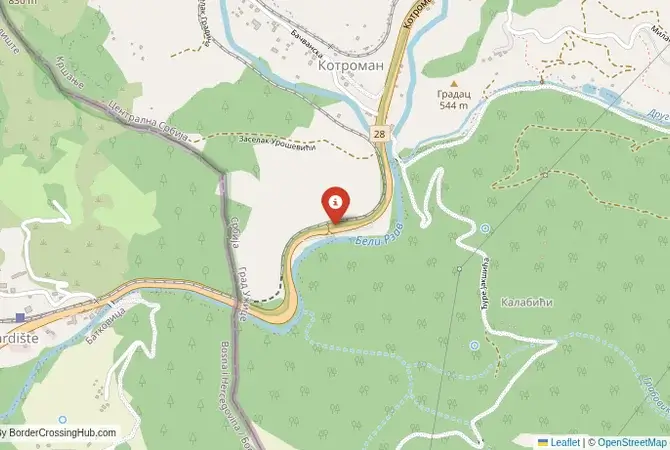
Approximate Border Location
Border Countries
Border Cities
- 🇧🇦Kotroman
- 🇷🇸Vardište
Wait Times
15-60 min for pedestrians/vehicles
Operating Hours
Open 6:00 AM – 10:00 PM
Crossing Types
Pedestrians, vehicles
Border Type
Land crossing via road
Peak Times
Mornings (7-10 AM)
Daily Crossings
~1500 travelers/vehicles
Currency Exchange
Limited near Kotroman (BAM, RSD)
Safety Information
Rural, minimal crime
Languages Spoken
Bosnian/Serbian
Accessibility Features
Ramps, assistance
About Kotroman & Vardište
A Scenic Crossing on a Historic Railway Route
The border crossing connecting the area near Kotroman in Serbia with Vardište in Bosnia and Herzegovina is a journey through one of the most scenic and historically fascinating parts of the border. This is a major international checkpoint, but its location in a narrow, winding mountain valley gives it a unique character. This route follows the path of the old, narrow-gauge Austro-Hungarian railway, a marvel of engineering that once connected Belgrade with Sarajevo. To cross here is to travel through a landscape of dramatic gorges, numerous tunnels, and a rich industrial and cultural heritage. It is a passage that is as much about the journey as the destination.
Operational Details
This checkpoint connects the Zlatibor District of Serbia with the Višegrad Municipality of Bosnia and Herzegovina (within the Republika Srpska entity). It is a major international crossing, open 24/7 to both passenger cars and commercial freight. It is located on the main road that connects the popular Serbian mountain resort of Zlatibor with the historic Bosnian town of Višegrad. The facility is modern and designed to handle a steady flow of traffic, but the winding mountain road can be challenging, especially for large trucks and in winter conditions.
Before Crossing
Crossing borders gets messy sometimes, think political flare-ups or gates shutting fast. Good travel insurance is a must for handling doctor visits, trip disruptions, or security scares. Don’t get caught unprepared. To find a policy that’s got your back, check out reliable plans today for peace of mind.
A History of the Narrow-Gauge Railway
The history of this region is the history of the “Ostbahn” or Eastern Railway, built by the Austro-Hungarians in the early 20th century to connect their newly administered territory of Bosnia with the rest of the empire. It was an engineering masterpiece, a narrow-gauge line that snaked its way through the seemingly impassable mountains. The section known as the “Šargan Eight” is a particularly famous series of loops and tunnels. The railway was closed in the 1970s, but a section on the Serbian side, the Šargan Eight, has been beautifully restored and is now one of the most popular tourist attractions in Serbia. The modern road follows the same path as the old railway.
Border Crossing Procedure
The border crossing procedure is a standard two-part process. You will first complete exit formalities at one country’s checkpoint and then proceed to the other country’s checkpoint for entry inspection. You will need a valid passport or, for citizens of many European countries, a national ID card. Vehicle registration and international insurance (Green Card) are also necessary. The process is generally straightforward, and the checkpoint is equipped to handle a steady flow of traffic. Queues can form, especially during the summer tourist season.
The Surrounding Region: Serbia Side
On the Serbian side, the crossing is the gateway to the Tara National Park and the popular mountain resort of Zlatibor. The main attraction is the Šargan Eight heritage railway, which offers a spectacular scenic journey. The nearby ethno-village of Drvengrad (Küstendorf), built by the famous film director Emir Kusturica, is another major tourist destination, with its unique wooden architecture and film festival. The region is a paradise for hikers, nature lovers, and those interested in industrial heritage.
The Surrounding Region: Bosnia and Herzegovina Side
On the Bosnian side, the crossing is just a short drive from the historic town of Višegrad. Višegrad is famous for its magnificent 16th-century Ottoman bridge over the Drina River, the Mehmed Paša Sokolović Bridge, which is a UNESCO World Heritage site and the subject of the Nobel Prize-winning novel “The Bridge on the Drina” by Ivo Andrić. The town is also home to Andrićgrad, a new stone town built as a tribute to the writer, also initiated by Emir Kusturica. The Drina River offers opportunities for boat trips through its spectacular canyon.
Practical Travel Information
Practical planning is essential for this route. You must have a suitable vehicle and be prepared for mountain driving. Check the weather and road conditions before you set out, especially in winter. The official currencies are the Serbian Dinar (RSD) in Serbia and the Bosnian Convertible Mark (BAM) in Bosnia and Herzegovina. Services at the border are limited. It is essential to plan for fuel and any currency exchange in the larger towns of Višegrad or Užice (in Serbia). Ensure your vehicle’s Green Card insurance is valid for both countries.
Final Considerations
The Kotroman–Vardište border crossing is a journey through a landscape of stunning natural beauty and immense cultural and historical significance. It is a vital link for tourism, connecting some of the most famous attractions in both Serbia and Bosnia and Herzegovina. It is a passage that follows a path of remarkable engineering, from the old narrow-gauge railway to the modern road. For the traveler, it is an unforgettable journey through the heart of the Dinaric Alps, a route that is rich in stories, scenery, and the shared heritage of the Drina valley.
See other crossings between Bosnia and Herzegovina and Serbia
See other crossings between Bosnia and Herzegovina and Serbia
No reviews yet.
